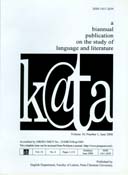"More than kin and less than kind": Hamlet and his (linguistic) problems
Abstract
T.S. Eliot's "Hamlet and His Problems" (1921) seems to be a pretext to add another erudite concept to the lexis of literary criticism. He charged both Hamlet and Hamlet of lacking "objective correlative." Eliot's own problem with the play, however, seems to arise from his particular epistemological perspective, his formalism, and even his implicit structuralism, and moreover, from his traditional, classic Cartesian modernity that suffers him to hold the notion of subject-object dichotomy in his literary speculations. Hamlet's problem, however, surpasses T. S. Eliot's structuralist view and anticipates the poststructuralist linguistic enigma. Hamlet and Hamlet's problems are, together with the other characters that are caught in the maze of language, linguistic. Hamlet's epistemological/ontological quest for the meaning or the truth are checked, patterned, done and ultimately undone by the language. He cannot find any "objective correlative" for his "particular emotion," for, in the signifying system of the language, all he can think or feel is restrained by "words". He cannot escape from the symbolic order of the language until his death, and "the rest is silence".
Downloads
References
Bloom, H. (1998). Shakespeare the Invention of the Human. USA: The Berkley Publishing Group.
Clemen, W. H. (1951). The Development of Shakespeare’s Imagery. New York: Hill and Wang.
Davies, B. (ed.). (1977). Hamlet. The Alexander Shakespeare. London & Glasgow: Collins Publishers.
Eliot, T. S. (1999). The Sacred Wood: Essays on Poetry and Criticism. Hamlet and His Problems. New York: Bartleby.com. 47-50.
Greenburg, B. (2007). T. S. Eliot's Impudence: Hamlet, Objective Correlative, and Formulation. Criticism. 49 (2) 215-239.
Kott, Jan. (1964). Shakespeare Our Contemporary. Translated by Boleslaw Taborski. New York: Doubleday & Company, Inc.
Mahdipour, A. (2007). The Existential Idea of Self in Shakespeare's Hamlet. Journal of Faculty of Letters & Humanities. 200. 133-147.
Rivkin J. & Ryan M. (eds.) (1998). Literary Theory: An Anthology. USA: Blackwell Publishers Inc.
Selden, R. (ed.). (2004). The Cambridge History of Literary Criticism. Vol. 8: From Formalism to Poststructuralism. Cambridge: Cambridge University Press.
The Holy Bible. (1961). Nashville: Gideons International.
Wells, S. (ed.) (1996). The Cambridge Companion to Shakespeare Studies. Cambridge: Cambridge University Press.

This work is licensed under a Creative Commons Attribution 4.0 International License.
![]() This work is licensed under a Creative Commons Attribution License
This work is licensed under a Creative Commons Attribution License




.png)
.png)

.png)












